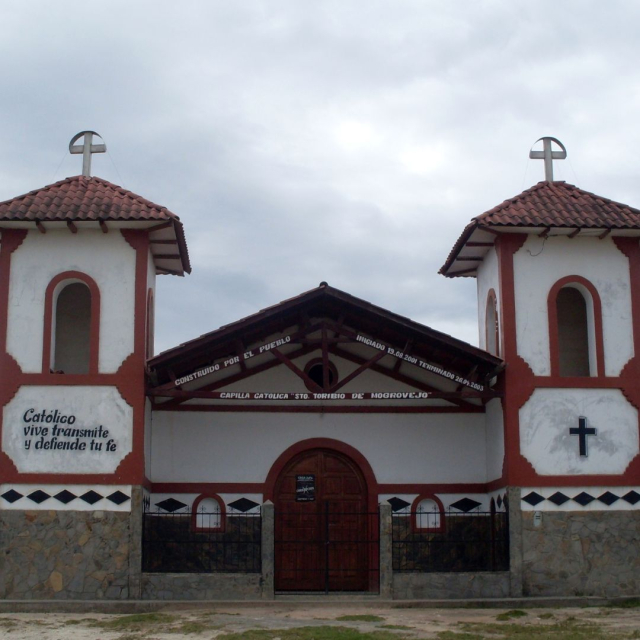Saint Toribio de Mogrovejo, a name that resonates strongly in the history of the Catholic Church in Latin America, is one of the most illustrious figures of evangelization in the New World. His legacy in Peru not only marked a before and after in religious history, but also laid the foundations for a church committed to the rights of indigenous peoples and Christian education.
Early years and training
Toribio Alfonso de Mogrovejo was born on November 16, 1538 in Mayorga, a small town in the region of León, Spain. He came from a noble family and stood out from a young age for his intelligence and virtues. He studied law and theology at the prestigious universities of Salamanca and Valladolid, where he acquired a deep knowledge of legal and religious matters. His reputation as a jurist led him to be appointed inquisitor in Granada, where he demonstrated a great sense of justice and commitment to the truth.
Appointment as Archbishop of Lima
In 1580, Toribio was chosen by King Philip II to serve as Archbishop of Lima, despite not being a priest at the time. Although his appointment surprised many, he was quickly ordained and set out for the Viceroyalty of Peru with a clear mission: to reform and revitalize the Church on the American continent.
Toribio arrived in Lima in 1581, where he faced a number of significant challenges. The local church was marked by problems of corruption, conflicts between religious leaders, and a lack of pastoral attention to indigenous communities. From his arrival, Saint Toribio was committed to transforming this reality through structural reforms, pastoral visits, and a tireless defense of the rights of the most vulnerable.
Evangelization and defense of indigenous people
One of the highlights of Santo Toribio’s ministry in Peru was his dedication to evangelizing indigenous peoples. He understood the importance of respecting and valuing local cultures, and he worked hard to learn native languages, such as Quechua and Aymara, with the goal of preaching the Gospel in the language of the original inhabitants. This action marked a milestone in evangelization, as it prioritized direct communication and cultural inclusion.
Saint Toribio convened and presided over the Third Council of Lima (1582-1583), which established essential norms for the administration of the sacraments, the formation of the clergy and the protection of indigenous rights. This council also resulted in the publication of the first catechism in indigenous languages, which facilitated the transmission of Christian doctrine in a way that was accessible to the native peoples.
Pastoral reforms
Saint Toribio was a tireless reformer. He made numerous pastoral visits throughout the Viceroyalty of Peru, traveling thousands of miles on foot and horseback. These visits were not only intended to administer the sacraments, but also to listen to the needs of the communities and supervise the work of the priests. During his travels, Saint Toribio faced difficult conditions, including rough terrain and illness, but he never gave up on his pastoral mission.
Among his most notable reforms were the creation of new parishes and the construction of churches, schools and hospitals. He also founded the Seminary of San Toribio, an institution dedicated to the training of priests who were prepared to serve in the particular conditions of the New World. This seminary remains, to this day, a reference point for religious education in Latin America.
Saint Toribio and the Peruvian saints
Saint Toribio had a significant impact on the lives of other Peruvian saints. He was a friend and mentor to Saint Rose of Lima, Saint Martin de Porres, and Saint John Macias, among others. His life example and commitment to faith inspired these saints to follow their own path of service and holiness. Furthermore, Saint Toribio confirmed Saint Rose of Lima, an act that symbolizes the union of these great figures in the religious history of Peru.
Death and canonization
Saint Toribio died on March 23, 1606 in Záña, a small town in northern Peru, while on one of his pastoral visits. His last words were a testimony of his faith and commitment: “Now, Lord, I can die in peace, because I have fulfilled your will.”
He was beatified in 1679 by Pope Innocent XI and canonized in 1726 by Pope Benedict XIII. His feast day is celebrated on March 23, and he is considered the patron saint of the Latin American episcopate, a recognition of his exceptional work as a pastor and spiritual leader.
Lasting legacy
The legacy of Saint Toribio de Mogrovejo in Peru is unquestionable. His life and work left a deep mark on the Catholic Church and Peruvian society. His focus on justice, cultural inclusion and education laid the foundation for a church closer to the needs of the people.
Today, Saint Toribio is remembered not only as a great evangelizer, but also as a defender of human rights and a model of pastoral leadership. His teachings continue to inspire millions of faithful and the ecclesiastical hierarchy throughout the world.
Saint Toribio de Mogrovejo was a man ahead of his time, whose vision and commitment transformed the Catholic Church in Peru and Latin America. His life is a reminder of the importance of faith, justice and selfless service. In a world full of challenges, his example remains a light that inspires us to work for a more just and compassionate future. His legacy endures as a testimony to what can be achieved when faith is combined with determined action on behalf of others.
